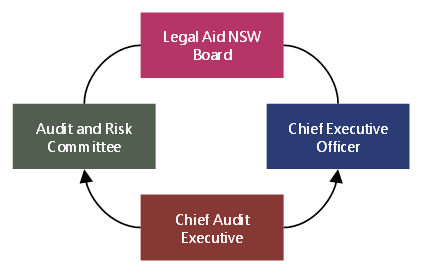Our Legal Aid NSW Code of Conduct addresses the requirements of the Public Service Commission and the Government Sector Employment Act 2013 (NSW) ethical framework provisions.
The code:
- sets the legal, ethical and institutional context for ethical conduct
- provides advice to all employees on demonstrating ethical good practice in leadership, decision-making and other responsibilities, and
- clearly outlines the responsibility of all employees to know, understand and comply with the ethical and legal obligations that apply to them.
The Code of Conduct has been included in the Legal Aid NSW induction program and individual planning.
All our lawyers are bound by professional practice standards and comply with continuing professional development requirements.
Legal Aid NSW has a strong financial focus, robust budgets and clear, concise reporting to internal and external stakeholders. Detailed monthly financial reports are prepared for the Audit and Risk Committee (ARC) and the Board. A commentary, including detailed analysis, is also provided. Members of the Executive provide expert advice at ARC and Board meetings.

Michael Coleman is a chartered accountant. He retired from KPMG in 2011 following a career that included 30 years as an audit partner and practice leader. Mr Coleman is the Chair of Legal Aid NSW’s ARC and is also a member of the Legal Aid NSW Board. He also sits on a number of other boards and audit committees, including Macquarie Bank. He is currently an Adjunct Professor at the Australia School of Business, University of New South Wales.
Peter Whitehead is a lawyer and the former Public Trustee of NSW. Mr Whitehead was part of the original committee reviewing the role of audit within the NSW Government. He has since chaired a number of NSW Government audit and risk committees, including for the NSW Department of Premier and Cabinet, what was then the NSW Attorney General’s Department, the NSW Crime Commission and the Judicial Commission of NSW. He currently works in the financial services industry.
Leah Fricke has had a 20-year executive career as a lawyer, governance professional and lecturer and 10 years of experience as a non-executive director. She is an independent non-executive director of Columbus Capital and Forager Funds, the Independent Chair of the audit and risk committee for Western NSW Local Health District and an independent member of the audit and risk committee of Sydney Local Health District. Ms Fricke holds a Bachelor of Laws/Bachelor of Arts from the University of Melbourne and an MBA from the University of Sydney. She is a Fellow of the Australian Institute of Company Directors, a Fellow of the Governance Institute of Australia and a member of the Association of Professional Futurists.
Nicola Davis is a chartered accountant. She retired from KPMG in 2021 following a career that included 35 years as an audit and advisory partner and practice leader, specialising in providing services to state and federal Governments. Ms Davis is an independent non-executive director of Mutual Trust Pty Ltd, where she is Chair of the Audit Committee, the Cash Fund Compliance Committee and the Trustee Compliance Committee and also a member of the Risk Committee. Ms Davis holds a Master of Arts (Economics) from the University of Cambridge, is a Graduate of the Australian Institute of Company Directors (GAICD) and is a member of the Institute of Chartered Accountants in Australia and New Zealand. She has previously held a number of other Board roles for various charities and foundations.
We have a corporate service disruption plan (enterprise plan) to respond to events that pose a risk to the continuation of business activities, and service disruption plans for each Legal Aid NSW office. The plans are reviewed periodically and activated when Legal Aid NSW cannot continue providing services from a regional or metropolitan office, including our Central Sydney Office. Plans address required actions and specify a recovery management team to oversee the recovery process.
Legal Aid NSW is committed to conducting business with honesty and transparency. Our Fraud and Corruption Prevention Framework outlines the steps we take to prevent fraud and other corrupt behaviour. Controls include responsibility structures, risk assessment, reporting systems, investigation standards and conduct and disciplinary standards. The Fraud and Corruption Prevention Plan implements key parts of the framework and complements related policies, including the Code of Conduct and Protected Disclosure Policy.
The year ahead
- We will conduct 10 audits.
- We will review the Legal Aid NSW Fraud and Corruption Framework, seeking feedback from ICAC and ensuring it aligns with the ICAC Assessing Corruption Control Maturity.
- We will implement the first year of the Legal Aid NSW Strategic Plan 2023–28.
Share with
Facebook
Twitter
LinkedIn